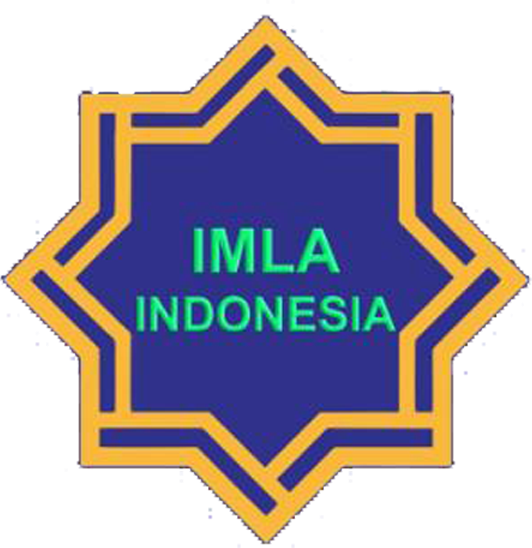The Effectivity of Himmati to Improve the Arabic Reading Skills Through the Online ATQ Program
Abstract
This article aimed to verify the effectivity of Himmati to improve the Arabic reading skills of beginners. The target population here was all of the beginners in Indonesia as well as some other countries in Southeast Asia. While the accessible population was the beginners in MAN 4 Banyuwangi, Indonesia among the new students of 2020/2021. Based on the experiment results on 21 samples who participated in the online ATQ program using Himmati, which were analyzed with the paired-sample t-test, it was found a value of sig. (2-tailed) 0,000 < P-value 0,50, while the value of tcount 5,901 > ttable 2,086. It showed that there was difference in the Arabic reading skills for beginners between pretest and post-test scores. Because the post-test score 87,19 > pretest score 80,38. So it can be concluded that Himmati is effective as a textbook to improve the Arabic reading skills for beginners in MAN 4 Banyuwangi. Thus, Himmati can be recommended as a textbook to be used by more beginners to improve the Arabic reading skills.
Keywords
Full Text:
PDFReferences
Al-Mawardi, I. S. (2019). Model Pembelajaran Pendidikan Perdamaian (Kajian Al-Qur’an Surat al-Nahl). Rahmatan Lil Alamin Journal of Peace Education and Islamic Studies, 2(1), 33–40.
Al-Rajihi, A. (1995). Ilm Lughah al-Tathbiqi wa Ta’lim al-’Arabiyah. Alexandria: Dar el-Ma’rifah el-Jami’ah.
Alhamuddin, A., Hamdani, F. F. R. S., Tandika, D., & Adwiyah, R. (2018). Developing Al-Quran Instruction Model Through 3a (Ajari Aku Al-Quran or Please Teach Me Al-Quran) To Improve Students’ Ability in Reading Al-Quran At Bandung Islamic University. International Journal of Education, 10(2), 95–100. https://doi.org/10.17509/ije.v10i2.8536
Bas/Wan. (2017). Indeks Literasi Al-Qur’an Siswa SMA.
Beddu, M. A. (2018). Strategi Pembelajaran Baca Tulis al-Qur’an pada SMA Negeri 4 Soppeng. UIN Alauddin Makasar.
Benitez-Correa, C., Gonzalez-Torres, P., Ochoa-Cueva, C., & Vargas-Saritama, A. (2019). A Comparison Between Deductive and Inductive Approaches for Teaching EFL Grammar to High School Students. International Journal of Instruction, 12(1), 225–236. https://doi.org/10.29333/iji.2019.12115a
Istiqomah, H. (2019). “HIMMATI” as a Modification Base Learning to Identify Al-Qur’an. Proceeding of International Conference on Islamic Education (ICIED), 4(1), 84–89. Retrieved from http://conferences.uin-malang.ac.id/index.php/icied/article/view/1070
Istiqomah, H., & Al-Badrani, M. J. H. (2020). Characteristic of Teaching Materials for Arabic Reading Skill with Inductive Approach. Izdihar: Journal of Arabic Language Teaching, Linguistics, and Literature, 3(2).
Istiqomah, H., Murtadho, N., & Mahliatussikah, H. (2020). Rancangan Pelaksanaan Program ATQ di MAN 4 Banyuwangi pada Masa Pandemi. Konasbara VI, 112–122. Malang: UM Press.
JSA-UM. (2016). Gebyar Pesona Hari Bahasa Arab Sedunia. Retrieved March 26, 2020, from IMLA; Ittihad Mudarris al-Lughah al-Arabiyah bi Indonesia website: http://imla.or.id/2016/12/20/gebyar-pesona-hari-bahasa-arab-sedunia/
Mallia, J. G. (2014). Inductive and Deductive Approaches to Teach English Grammar. AWEJ: Arab World English Journal, 5(2), 221–235. Retrieved from www.awej.org
Otaya, L. G., Anwar, H., & Husain, R. T. (2019). Estimating the Students’ Skill in Reciting and Writing Al-Qur’an at Faculty of Tarbiyah and Teacher Training IAIN Sultan Amai Gorontalo. Nadwa : Jurnal Pendidikan Islam, 13(1), 75–94. https://doi.org/10.21580/nw.2019.1.1.3590
Santoso, S. (2014). Statistik Parametrik: Kosep Dasar dan Aplikasi dengan SPSS. Jakarta: Elex Media Komputindo.
Supriyadi, T., & Julia, J. (2019). The problem of students in reading the Quran: A reflective-critical treatment through action research. International Journal of Instruction, 12(1), 311–326. https://doi.org/10.29333/iji.2019.12121a
Taufik. (2019). Nilai Pendidikan Iman dan Ilmu Pengetahuan dalam Tafsir AL-Misbah (Kajian Surat Al-Mujadilah 58: 11). Andragogi: Jurnal Pendidikan Islam Dan Manajemen Pendidikan Islam, 1(2), 317–331. https://doi.org/10.36671/andragogi.v1i2.60
Zarif, M. M. M., Mohamad, N., & Bakar, B. A. (2014). Assessing Quranic Reading Proficiency in the j-QAF Programme. International Education Studies, 7(6), 1–8. https://doi.org/10.5539/ies.v7n6p1
DOI: http://dx.doi.org/10.17977/um056v5i2p156-164
Refbacks
- There are currently no refbacks.
Copyright (c) 2021 Himatul Istiqomah, Nurul Murtadho, Hanik Mahliatussikah, Yhusi Karina Riskawati, Mohammad Jawad Habeeb Al-Badrani

This work is licensed under a Creative Commons Attribution-NonCommercial 4.0 International License.
AL-ARABI is indexed by:
Editorial Office:
Al-Arabi: Journal of Teaching Arabic as a Foreign Language
Arabic Department, Faculty of Letters, Universitas Negeri Malang (UM)
Jalan Semarang 5, Malang 65145, Indonesia.
Telephone: (0341) 551312 Ext. 239. Fax (0341) 567475.
E-mail: alarabi@um.ac.id

Al-Arabi: Journal of Teaching Arabic as a Foreign Language is licensed under a Creative Commons Attribution 4.0 International License.
Based on a work at http://journal2.um.ac.id/index.php/alarabi/










